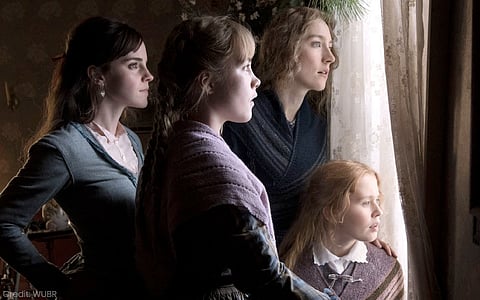
- Reviews
- Power List 2024
- Cannes 2024
- In-Depth Stories
- Web Stories
- News
- FC Lists
- Interviews
- Features
- FC SpecialsFC Specials

Director: Greta Gerwig
Cast: Saoirse Ronan, Emma Watson, Florence Pugh, Eliza Scanlen, Laura Dern, Timothée Chalamet
Duration: 2 hours 15 minutes
It is quite fitting that Jo (Saoirse Ronan) needs to be told that she is in love. She is a writer, afterall; emotions are never quite felt with the immediacy of words. The phonetic universe is precise, and controlled. Even when you're being profound or messy with words, they don't linger much beyond that moment. Quotes, even the memorable ones often fade in time. Emotions, however, endure. Little Women attempts to straddle the two universes, trying to stun us with its profound words in the moment it is delivered, and also tether us to it forever with its emotional landscaping.
The former it does successfully. The latter, I am not too sure of.
Little Women is about four women outgrowing the little-ness that is bestowed upon them at birth. (It is adapted from Louisa May Alcott's iconic 1868 novel of the same name by Greta Gerwig who also directed it) They are sisters who feud ferociously and love longingly (and, not but; the and-ness being unique to sibling-hood where a fight doesn't take away from love as opposed to cementing it). One wants to paint (a mercurial and effective Florence Pugh), one wants to play the piano (a quiet and unsubtle Eliza Scanlen), one wants to write, and one prefers the quiet domesticity of stable love (an effectively subdued Emma Watson). There is also their neighbour, Laurie (Timothée Chalamet, an eternal well-spring of charm) who couldn't care less for words; it is all about feeling for him, not articulating. (In the film where almost every character is given a profound line or two, he isn't; it befits the character. Even when he articulates his love, it is so messy and persistent, almost as if he doesn't want to be quoted.) Almost to compensate for the lack of good dialogue, he is made to love two people, simultaneously, but differently. I have always loved a film that tackles the ability of humans to love more than one person at the same time. It then becomes about what kind of love one wants to pursue.
Love in this film is so fragile. There are two things: loving someone, and being loved by someone. In relationships there is often an arithmetic of who loves whom more, or less, or at all. It is perhaps nice to know that such quandaries existed even in the 1800s. Or perhaps this is one of the contemporary additions Gerwig made; the luxury of choosing a partner that one not only loves but is loved by on one's own terms.
That's a problem with the film- so much of the beauty in dialogues are not meant to be taken seriously- they are just meant to stun you in that moment, force you to take note of it lest you forget
Literature too is fragile. There's a wonderful moment in the movie when the sisters are conversing and Jo is telling them about how perhaps her novel about their life, and the intimate exhaustions of their human experience, isn't grand enough to become a celebrated, important novel. One of the sisters, the painter of course, points that perhaps she feels it isn't important because it hasn't been written about yet, to which Jo says, "Writing doesn't confer importance, it reflects it." Don't get too carried away with its profundity- she doesn't mean it.
(And that's a problem with the film- so much of the beauty in dialogues are not meant to be taken seriously- they are just meant to stun you in that moment, force you to take note of it lest you forget, but as you write it down, you realize it really isn't true, even for that character. Gerwig's characters have this annoying self-importance they use words to convey, which is why Laurie was much needed respite.)
It begs the questions- what does Jo consider "important"? In that one dialogue she has completely ignored the history of literature being the privilege of rich white men who live rich white lives. She even dismisses criticism in a moving moment when her writing has been trashed by someone whose opinion she considers important. These moments are never reconsidered, and neither does she apologize for them. Perhaps that is who she is, a writer who takes herself far more seriously than her words. Ronan plays out this complexity with such ease and comfort, it's a joy to watch her take flight.
Of course, it is too early to say how a film will age. But I have a gut feeling years from now when someone will refer to Little Women, I will reminisce about it merely for its profound dialogues, none of which I would remember (and Timothee Chalamet). That's perhaps a failure. Or perhaps that's cinema. And isn't that a scary thought?